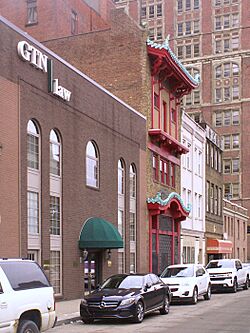Chinatown, Pittsburgh facts for kids
Quick facts for kids
Chinatown
|
|
|---|---|
|
Sub-neighborhood
|
|

Chinatown Pittsburgh in 2020
|
|
| Lua error in Module:Location_map at line 416: Malformed coordinates value. | |
| Country | |
| State | Pennsylvania |
| County | Allegheny County |
| City | Pittsburgh |
| ZIP Code |
15219
|
| Area code(s) | 412 |
Pittsburgh, a city in Pennsylvania, once had a small but busy Chinatown. It was located in Downtown Pittsburgh where Grant Street and Boulevard of the Allies meet. Today, only one Chinese restaurant remains there. The On Leong Society was an important group in this area. The first Chinese community in Pittsburgh started around Wylie Avenue. Later, it grew to include Grant Street, Water Street, and then Second and Third avenues.
Contents
History of Pittsburgh's Chinatown
How Pittsburgh's Chinatown Began
Pittsburgh's Chinatown grew because of Chinese immigrants. Many came from the Canton area of China. They moved east from California after the 1849 Gold Rush. This was a time when many people rushed to find gold. They also came after the transcontinental railroads were built. These railroads made it easier to travel across the country.
Changes to the Chinatown Area
The heart of Chinatown was mainly on Second Avenue. There were shops like "Wing Hong Chinese Co." and "Quong Chong Shing." However, by the 1930s, Chinatown was already shrinking. By the 1950s, all the buildings on Second Avenue were torn down. This happened to make way for the Boulevard of the Allies. This road construction forced many businesses to close or move.
Life in Old Pittsburgh's Chinatown
Daily Life and Challenges
From the 1920s to the 1930s, Pittsburgh's Chinatown faced some challenges. There were sometimes arguments between different Chinese groups. These events were sometimes called "Tong Wars" by local newspapers. Papers like the Pittsburgh Post-Gazette and the Pittsburgh Press wrote about them. The news stories sometimes made these events sound more dramatic than they were. This was not always fair to the Chinese community.
The On Leong Merchants Association Building
Despite challenges, the community had important places. On Second Avenue, there was a special building. It looked like a temple with a pagoda-style roof. It had three stories and beautiful tiled roofs. Its leaded windows gave it an "Oriental distinction." Inside, the building was very grand. It had rich embroidery and hangings. There was also fine teakwood and mother-of-pearl decorations. Red lacquer and gilt carvings added to its beauty. A carved stone altar was used for worship. A long table was used for meetings of the On Leong Merchants Association. This building was a central part of the community.




